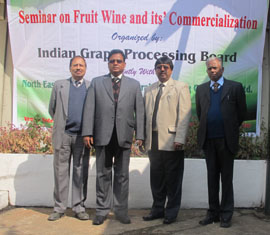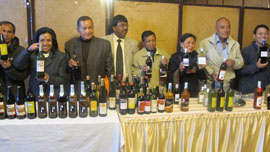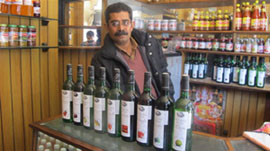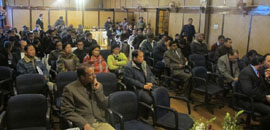May 08: Shimla may be the current center of fruit wines in India but Shillong could give the leading state of Himachal Pradesh a run for the money, if the Conference held on January 19 by NERAMAC in collaboration with the Indian Grape Processing Board at this Meghalaya’s capital fructifies into positive action, writes Subhash Arora who was invited as a speaker at the technical session.
 |
| With Mr A.T. Mondal , Minister of Excise and Power and Mr. S. Bhattacharjee, MD of Neramac |
As one leaves Guwahati airport in Assam for a seemingly endless journey to the Shimla-like hill station of Shillong in Meghalaya, through traffic snarls and congested roads, it is interesting to see the road dividing Assam on the left and Meghalaya on the right-what differentiates the two states is an endless run of liquor shops (surprise, surprise; they are known as Wine Shops in these states too) in Meghalaya on your right and practically no shops on the left. The Reason is not too difficult to guess- the taxes are significantly lower in this newer state of India.
It is only a day later one discovers that while one can drink oneself silly, production of wine, including the lower alcohol fruit wines is not permitted in the State with abundance of fruits like strawberries, pineapples, passion fruits and a local dark cherry-like fruit called Sohiyong. The reason, as Mr. A.T. Mondal, State Minister for Power and Excise (and one thinks in Delhi that Excise department has all the Power anyway!) explained while he inaugurated the Fruit Wine Conference, was that Meghalaya was still controlled by the pre- independence, pre-Constitution, Assam Excise Act of 1945 which does not permit production of wine or any alcohol.
Mr. Mondal was quite sympathetic to the cause of state fruit wine makers, seven of whom had brought their products for display and tasting (while there is no excise duty, display and tasting requires special permission from the government). These home fruit wine producers have been brought under a common umbrella by an enthusiastic young man Michael Syiem who is the president of a group called ‘Forever Young’. Who has been organising the Shillong Wine Festival for the last 7 years, practically without support from any quarter, he says.
While Mr. Subhash Bhattacharjee, the M.D. of North Eastern Regional Agricultural Marketing Corporation (NERAMAC) Ltd, a government marketing organisation had been instrumental in hosting the conference and was able to get the IGPB to sponsor the event, the basic hurdle of not allowing wine to be made commercially implies that the quality and scope of production cannot improve much..
 |
| Seven fruit wine producers with the MD of Neramac |
The enthusiasm of the people who are involved in this cottage industry and the quality level to which some of the wines have reached could make fruit wine-making a reality and give a leading state like Shimla a run for its money. Some of the wines tasted were very good to excellent, although there were a few that were either undrinkable or did not inspire. Priced at around Rs.300-600, they were quite expensive if one compared them to those in Himachal selling for as low as Rs.100-120 a bottle.
Shimla and Fruit Wines of Himachal Pradesh
Earlier this month, I scouted around to survey the Himachal Pradesh fruit wine industry market where wine excise laws are the most liberal in the country and ought to be used as a model in other states. Even the VAT which was only 4% till recently is 13.75% (not much higher than the 10% on juices). The leading brand is Waterfall Wines - the new label introduced a couple of years ago, in lieu of Sutter House being used earlier by the Future Wine and Spirits Brands which was obliged to stop using it through a legal action by the Napa Valley based Sutter Home (already reported by delWine). The company sells around 10-12,000 cases of fruit wines annually.
The state owned HP Horticultural Produce Marketing and Processing Corporation (HPMC) which pioneered the fruit wine processing is reportedly down to under 5,000 cases of annual sales, according to market reports.
The rising star of the industry has been Minocha Industries, located in a small town Shoghi on the outskirts of Shimla, known for its Minchy label of pickles and juices. Owned by Girish Minocha, an engineering graduate from Delhi, it was forced into making fruit wine due to competition blocking its distribution system for juices and pickles in the absence of fruit wines. Today Minocha sells 7-8,000 cases and already makes nine types of fruit wines under Wonder Wyne label from apple, apricot, peaches, strawberries, cherries, kiwis, rhododendron (flower), pear and grape (very small quantities) wines.
Including a small production by a few other units, the current 25-30, 000 case wine industry of HP seems to have scratched the surface only, although Minocha feels it is already saturated. Fruit wines are priced quite low at Rs.130-160 a bottle (retailed at Rs.150-220). But they are not being marketed aggressively. The excise duty in Himachal is negligible, at around Rs.4 a bottle for an alcohol level up to 11.4% according to Minocha. Higher duties in the adjoining states make the export outside the state a difficult preposition.
| Photo By:: Adil Arora |
 |
| Girish Minocha -owner of Minocha Industries, Shogi-Shimla |
I tasted all his wines and found that the peach wine was really delicious, followed by apple. Both white wines would make an enjoyable aperitif or even a meal condiment. However rhododendron wine was practically undrinkable- this wine has a market because the local flower is considered good for heart. Girish is currently experimenting with cherry wine which would one day make a good dessert wine, if priced right.
The strength of fruit wine is its ability to retain the original fruit flavours (although it would be considered a limitation by most wine connoisseurs). Many dealers confirmed that the customer preferred to pick up cases of mixed fruit wines, depending upon the penchant for a particular fruit. Although it can but made from fruits, vegetables, flowers-practically any organic matter that can be fermented, the proximity and specialty of the fruit and the wastage factor of fresh fruit play an important role in the development of this industry. It is not surprising that every state in the US makes wine-if you consider fruit wine as wine; EU laws do not allow wines other than those made from grapes to be nomenclatured as wine. The fruit wines also need to be generally drunk young as they do not age like wines made from grapes- within two years of bottling is advisable for most.
The fruit wine producers in Meghalaya are capable of improving the quality in the long run, as was evident from their current status and eagerness to learn. The deputy secretary of MOFPI, Mr. Randhir Patel announced his ministry’s support to the industry by agreeing to sponsor the next wine festival (Shillong is the capital of rock bands in the country and they add an extra dimension to the fest) in April and also promised to help buy lab equipment, but the industry cannot come up to the higher levels unless the laws make it possible to commercialise this sector.
 |
| Audience at the Conference |
Fruit wine in India will have a niche market at best, where the excess quantity of fruit abundant in the areas can be harnessed. Meghalaya has plenty of pineapple, passion fruit and sohiyong that would make decent wines once the proper focus and commercial exploitation is feasible. Price of the final product may have to come down drastically like in Himachal Pradesh, to encourage consumption.
All this is possible only if and when the government of Meghalaya takes some positive steps to allow harnessing of the fermentation capability of its abundant fresh fruits. As the Minister said in a typical diplomatic style, various groups have to be consulted before any positive action can be taken. In political parlance could mean scuttling of the project-unless the Ministry of Food Processing Industries can step in and help the state take a positive decision.
Subhash Arora
If you Like this article please click on the Like button